21 Best Foods For Strong Teeth And Gums

Key Takeaway:
- A balanced diet that includes foods with calcium, phosphorus, vitamin D, fluoride, and antioxidants is crucial for maintaining healthy teeth and gums.
- Sugary or acidic foods and beverages should be limited as they contribute to tooth decay.
- Dairy products such as cheese, milk, and yogurt, as well as water, celery, and carrots, are great for promoting dental health.
- Regular dental checkups and good oral hygiene habits, such as brushing twice a day and flossing daily, are essential for preventing dental problems.
Do you want to maintain strong teeth and healthy gums? The key is not just brushing and flossing regularly, but also eating a balanced diet that includes foods that promote dental health.
In fact, what you eat can have a significant impact on the health of your teeth and gums. In this article, we will explore the 21 best foods for strong teeth and gums. These foods are packed with essential nutrients that help prevent tooth decay, gum disease, and other oral health problems.
By incorporating these foods into your diet, you can improve your overall dental health and enjoy a brighter smile for years to come. So let’s dive in!
Best foods for strong teeth and gums
If you’re looking for ways to keep your teeth and gums healthy, there are a few key foods that you should definitely consider incorporating into your diet.
- Cheese is a great option because it’s high in calcium, which can help strengthen your teeth.
- Milk and yogurt are also good choices since they contain both calcium and phosphorus – two nutrients that work together to protect your teeth from decay.
- Drinking water regularly can also be beneficial, as it helps wash away food particles and bacteria in the mouth.
- Finally, chewing on celery can help promote saliva production, which is important for neutralizing acids in the mouth that can erode tooth enamel.
1. Cheese
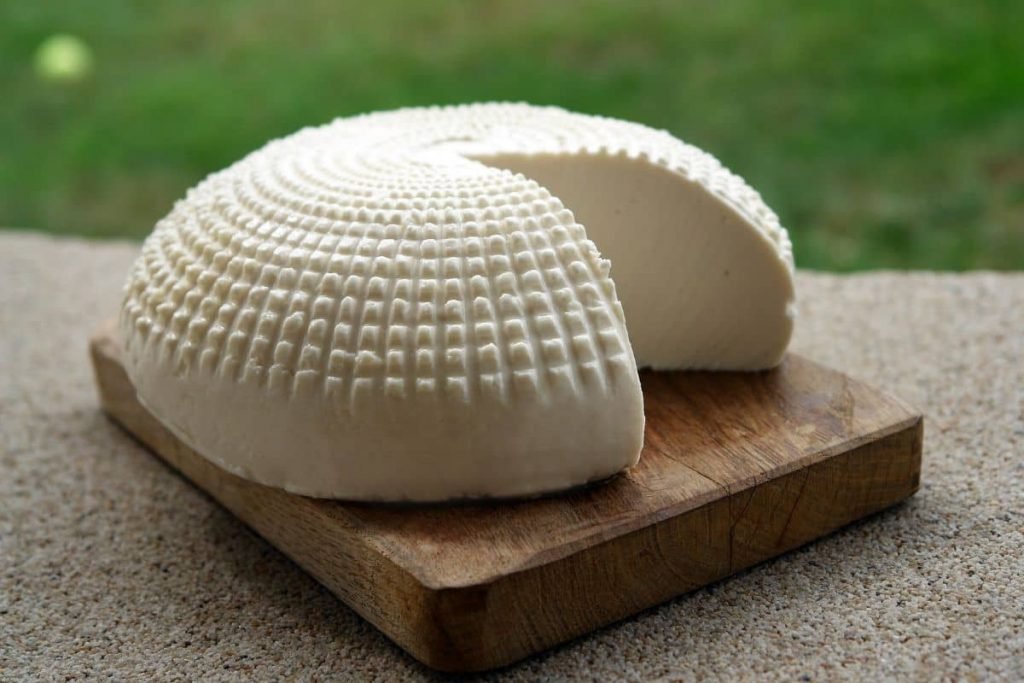
You can’t go wrong with cheese when it comes to strengthening your teeth and gums. Not only is it delicious, but it also contains several nutrients that promote oral health.
Cheese is high in calcium, which helps build strong bones and teeth. It also contains casein, a protein that helps neutralize acid in the mouth, reducing the risk of tooth decay.
There are many ways to incorporate cheese into your diet for optimal dental health. You can pair it with other tooth-friendly foods like apples or celery to increase saliva production and wash away harmful bacteria.
Cheese also makes for a great snack option between meals or as part of a meal for kids’ dental health. So next time you’re looking for a satisfying snack, reach for some cheese!
Moving on to the next topic, milk is another dairy product that’s beneficial for oral health.
2. Milk
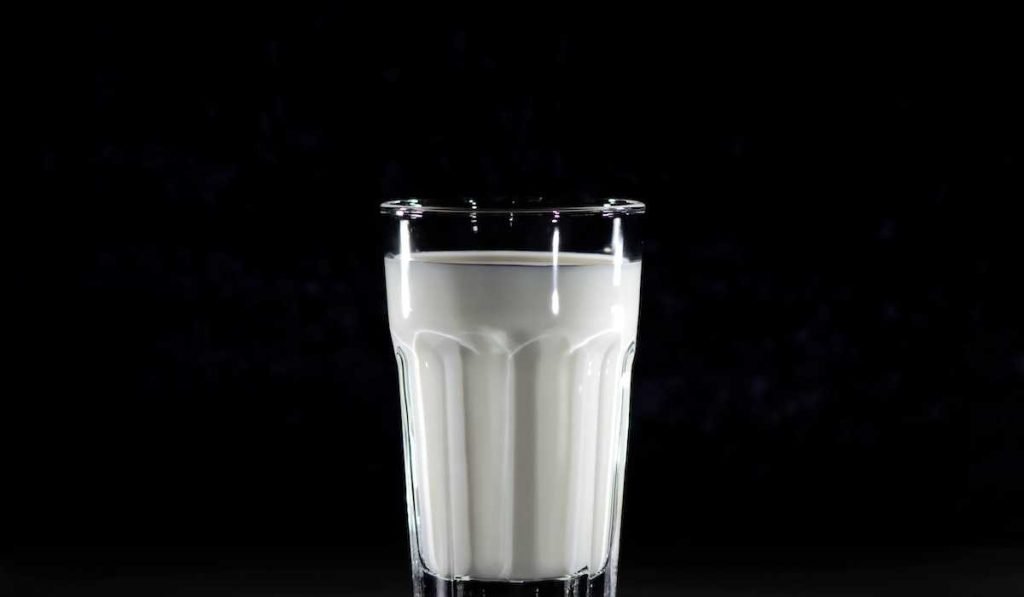
Milk is a great source of calcium and vitamin D, with just one cup providing 30% of the recommended daily intake of calcium. This makes it an excellent choice for maintaining strong teeth and gums.
If you’re lactose intolerant or simply prefer not to consume dairy products, there are alternatives to milk that can also promote strong teeth and gums.
Some non-dairy options include fortified soy milk, almond milk, and rice milk.
Additionally, incorporating milk-based recipes such as yogurt into your diet can also provide the necessary nutrients for healthy teeth.
3. Yogurt
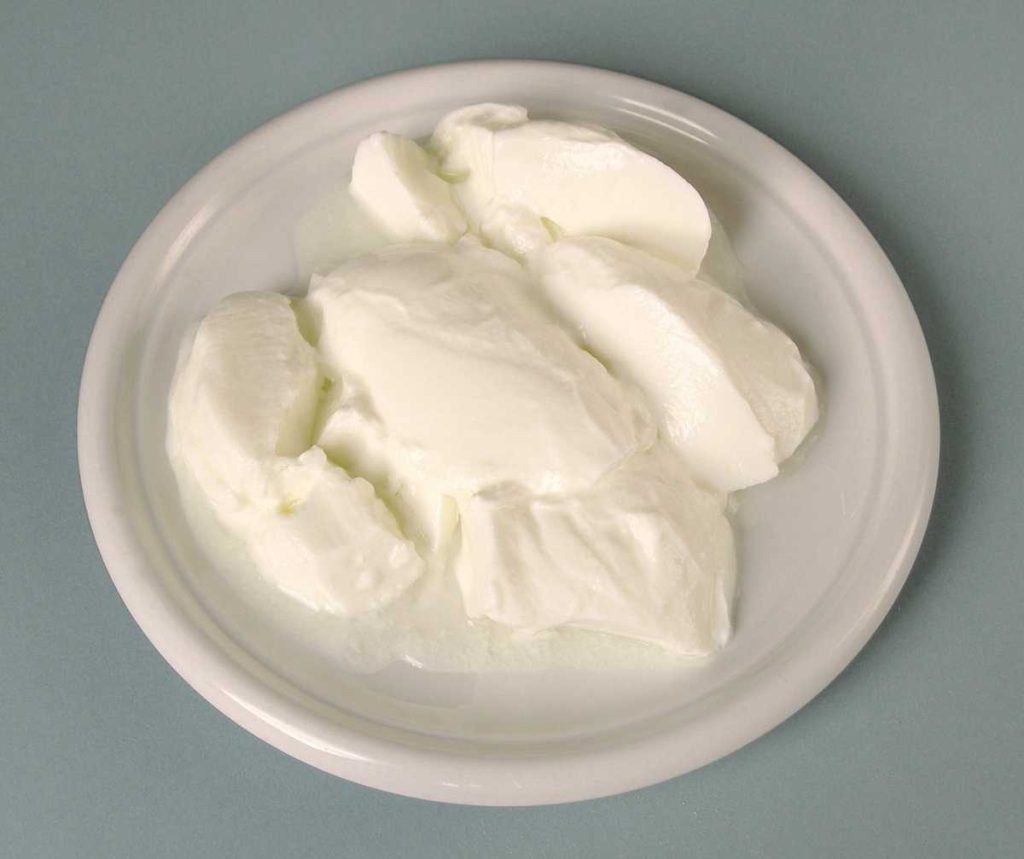
When it comes to maintaining a healthy diet, don’t forget about yogurt! Yogurt is not only a delicious snack, but it also has numerous benefits for your oral health. The calcium and probiotics found in yogurt can help strengthen your teeth and gums.
To fully benefit from the advantages of yogurt for your oral health, it’s important to choose the right type of yogurt.
Opt for plain or Greek yogurt as they have less added sugar compared to flavored options. You can also incorporate yogurt into your diet by adding it to smoothies or using it as a substitute for sour cream in recipes.
Additionally, you can try making your own homemade frozen yogurt popsicles for a tasty and healthy treat.
There are also some home remedies that use yogurt that may help alleviate gum disease symptoms such as inflammation and bleeding.
One such remedy involves mixing equal parts of plain yogurt and honey then applying the mixture onto affected areas with a clean finger or cotton swab.
However, if you’re experiencing severe gum issues, it’s best to consult with your dentist before trying any home remedies.
Next up, let’s talk about another crucial component of maintaining good oral health – water.
4. Water

Staying hydrated with water is essential for a healthy mouth and can help prevent dry mouth, which can lead to bad breath and tooth decay. Drinking water also helps wash away food particles and bacteria that can cause plaque buildup on teeth.
Here are three benefits of hydration:
- Reduces risk of cavities: By drinking water throughout the day, you increase saliva production in your mouth which neutralizes the acids produced by bacteria that cause tooth decay.
- Promotes gum health: Proper hydration helps keep your gums healthy by providing them with nutrients they need to stay healthy.
- Helps digestion: Water assists in breaking down food particles and moving them through the digestive system, preventing constipation which can lead to bad breath.
To maintain good oral health, it’s recommended that you drink at least 8 glasses of water per day. If you struggle with drinking plain water, try adding a slice of lemon or lime for some flavor. Alternatively, herbal teas or coconut water are great options as well!
Remember to sip on water throughout the day instead of chugging it all at once. This will ensure that your body stays properly hydrated throughout the day.
Now let’s move on to celery – another food item that’s great for strong teeth and gums!
5. Celery
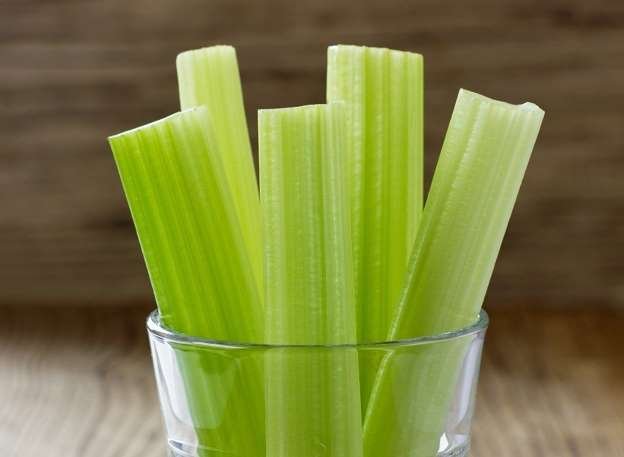
Eating celery regularly can help improve overall oral health, as some experts believe it may have a natural cleaning effect on teeth.
Celery is low in calories and high in fiber, making it an excellent snack choice for those looking to maintain healthy teeth and gums. In addition to its natural cleaning properties, celery also contains vitamins A and C, which are essential for good dental health.
To give you a better idea of the nutritional value of celery for oral health, let’s take a look at this table:
| Nutrient | Amount per 100g |
|---|---|
| Fiber | 1.6g |
| Vitamin A | 22% RDA |
| Vitamin C | 9% RDA |
As you can see, celery is packed with important nutrients that can benefit your dental health. To incorporate more celery into your diet for strong teeth, try adding it to salads or using it as a crunchy topping on sandwiches.
Other vegetables that promote dental health include carrots, which we’ll discuss in the next section.
6. Carrots

Carrots are another great vegetable choice when it comes to maintaining healthy teeth and gums.
You can boost your oral health by incorporating a crunchy and nutritious vegetable like carrots into your daily diet. Carrots aren’t only delicious but also packed with vitamins and minerals that are essential for strong teeth and gums.
They are rich in vitamin A, which is necessary for the development of healthy tooth enamel. [1]
Vitamin A also helps maintain healthy saliva production, which plays a crucial role in keeping harmful bacteria at bay. [2]
Compared to other vegetables, carrots have a unique texture that makes them an excellent choice for maintaining good dental health.
Their fibrous nature stimulates the production of saliva, which neutralizes acid in the mouth and helps prevent cavities. Additionally, scientific evidence supports the role of carrots as an effective way to remove plaque from teeth surfaces.
You can easily incorporate this vegetable into your diet by adding carrot sticks or grated carrots to salads or as a snack. Try making some carrot juice or smoothie for breakfast and enjoy all the benefits it has on your dental health!
Leafy greens like spinach are another great addition to any oral hygiene regimen.
7. Spinach
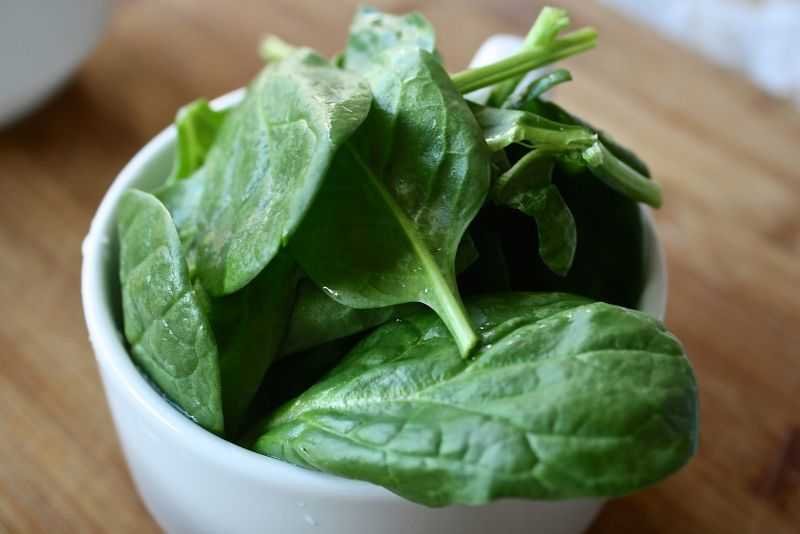
If you’re looking for a superfood that can help strengthen your teeth and gums, look no further than spinach. This leafy green is packed with nutrients that can benefit your dental health in a number of ways.
Here are four reasons why spinach should be incorporated into your diet for strong teeth and gums:
1. Spinach is rich in calcium, which helps build strong enamel on your teeth.
2. It also contains vitamin C, which reduces inflammation and promotes healthy gum tissue.
3. The high levels of antioxidants found in spinach can help protect against oral cancer.
4. Finally, the folate in spinach has been shown to reduce the risk of gum disease.
But how can you incorporate this powerful vegetable into your diet? Try making a spinach salad with some added nuts or seeds for crunch, or sautéing it with garlic as a side dish. If you’re feeling adventurous, blend up a spinach smoothie with some fruit and yogurt for a refreshing treat that’s good for your teeth too!
Next up: Lettuce!
8. Lettuce
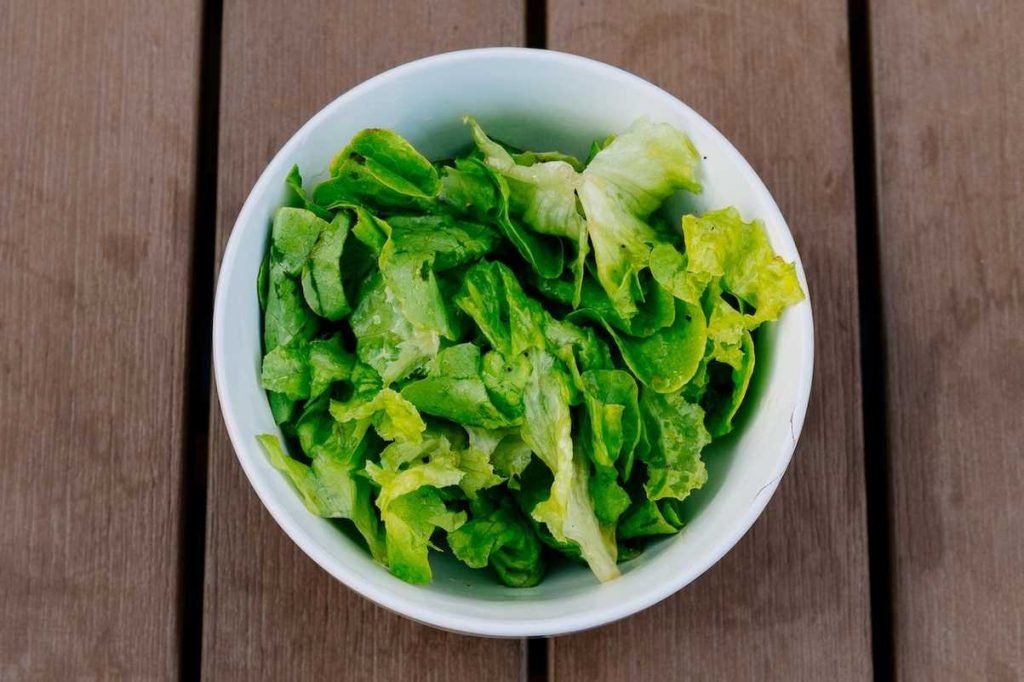
Get ready to add some crunch to your meals because lettuce is here to not only satisfy your taste buds but also benefit your overall health. Lettuce is a leafy green that comes in many varieties, including romaine, iceberg, and butterhead.
It’s low in calories but high in nutrients, making it an excellent choice for those who want to maintain a healthy diet. Lettuce benefits go beyond just being a low-calorie food. It’s rich in vitamins A and K, which are essential for maintaining healthy teeth and gums. Additionally, the fiber content in lettuce helps promote good digestion, preventing constipation and other digestive problems.
You can incorporate lettuce into your diet by adding it to salads or smoothies. There are many salad recipes available online that feature different types of lettuce as the star ingredient.
Now that you know about the benefits of lettuce, let’s move on to another leafy green: kale.
9. Kale
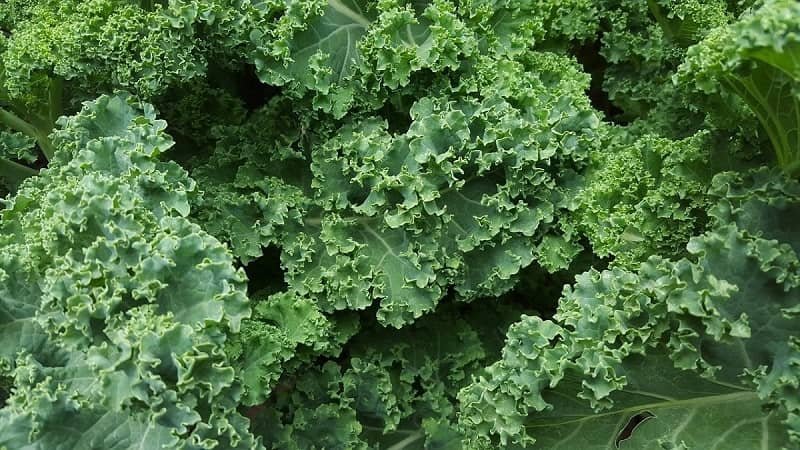
Kale is not just another trendy vegetable, it’s a nutrient powerhouse that can help boost your overall health and well-being. This leafy green is low in calories and high in nutrients, making it an excellent food choice for strong teeth and gums.
Kale is packed with vitamins A, C, and K, which are essential for maintaining healthy teeth and gums. Vitamin A helps to keep the mucous membranes in your mouth healthy while vitamin C promotes collagen production and fights against bacterial infections that cause gum disease. On the other hand, vitamin K helps to strengthen bones including those surrounding your teeth.
Incorporating kale into your diet doesn’t have to be boring! There are plenty of kale recipes out there that can make eating this superfood a delicious experience.
Try adding some kale to your smoothies or mixing it with other greens for a refreshing salad. With its abundance of nutritional value, kale is an excellent addition to any meal plan focused on promoting oral health.
Up next: let’s talk about another food that can help improve the strength of your teeth and gums – apples!
10. Apples

You’ll be pleased to know that incorporating apples into your diet can positively impact your overall oral health. Apples are a great source of fiber, which helps stimulate saliva production in your mouth. This increased saliva production helps wash away harmful bacteria and food particles from your teeth, reducing the risk of tooth decay and gum disease.
In addition to their oral health benefits, apples also have a high nutritional value. They contain vitamins C and K, as well as potassium and antioxidants.
To incorporate more apples into your diet, try adding slices to your salads or oatmeal, or enjoy them as a healthy snack with some nut butter. You can even use apples in recipes for baked goods like muffins or pies.
So, go ahead and take a bite out of this delicious fruit for not only its taste but also its importance for oral health.
As important as apples are for strong teeth and gums, pears also offer similar nutritional benefits.
11. Pears
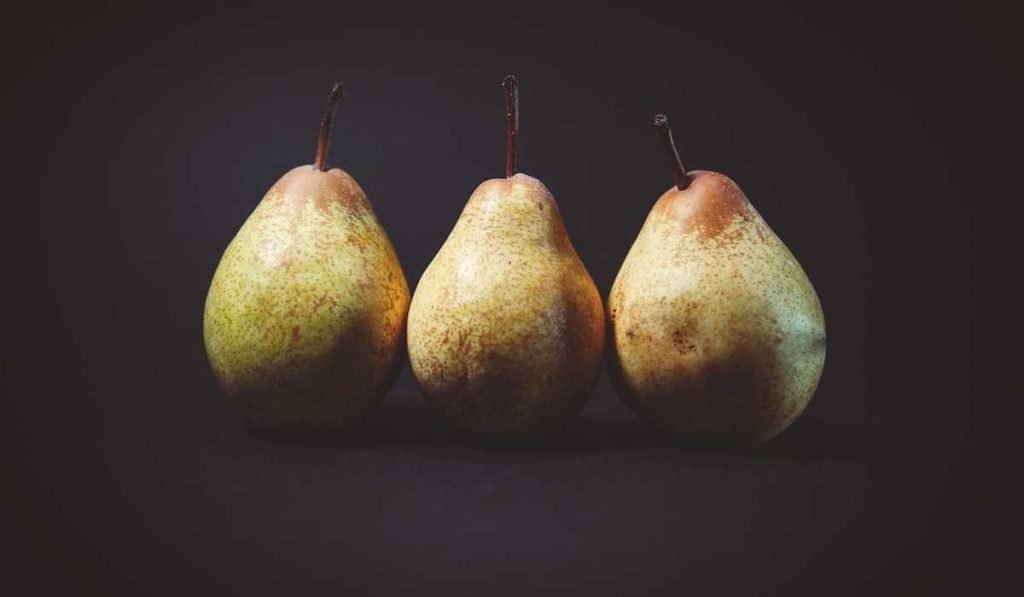
Pears are a delicious and nutritious fruit that can improve overall health. Did you know that one medium pear contains 6 grams of fiber, which is about 24% of the recommended daily intake?
Pears also contain vitamins C and K, as well as copper, which helps with the absorption of iron. These nutrients are essential for maintaining strong teeth and gums.
Incorporating pears into your diet is easy! You can slice them up and add them to salads or smoothies, or simply enjoy them whole as a snack. Additionally, pears have natural teeth whitening properties due to their high water content and ability to neutralize acid in the mouth.
Eating pears regularly can also help freshen breath by reducing bacteria in the mouth. So why not add some juicy pears to your next meal or snack?
Nuts are another great food for strong teeth and gums because they contain essential nutrients like calcium and phosphorus.
12. Nuts
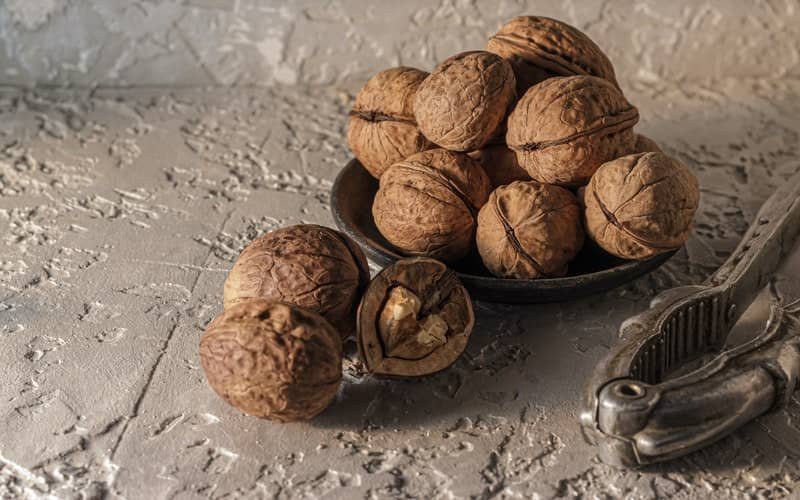
Indulging in a handful of nuts each day can give you a boost of energy and leave you feeling satisfied. Different types of nuts, such as almonds, walnuts, pistachios, and cashews are all great sources of protein, fiber, healthy fats, vitamins and minerals.
Almonds are rich in calcium which is essential for strong teeth and gums while walnuts contain omega-3 fatty acids that help reduce inflammation in the body. [3]
Incorporating nuts into your diet is easy. You can add them to your morning smoothie or oatmeal bowl for breakfast or sprinkle them on top of your salad at lunchtime.
Nut butters like almond or peanut butter also make a great spread for sandwiches or as a dip for apple slices.
The nutritional value of nuts makes them an ideal snack choice that will keep you full between meals and provide numerous health benefits.
13. Fatty fish
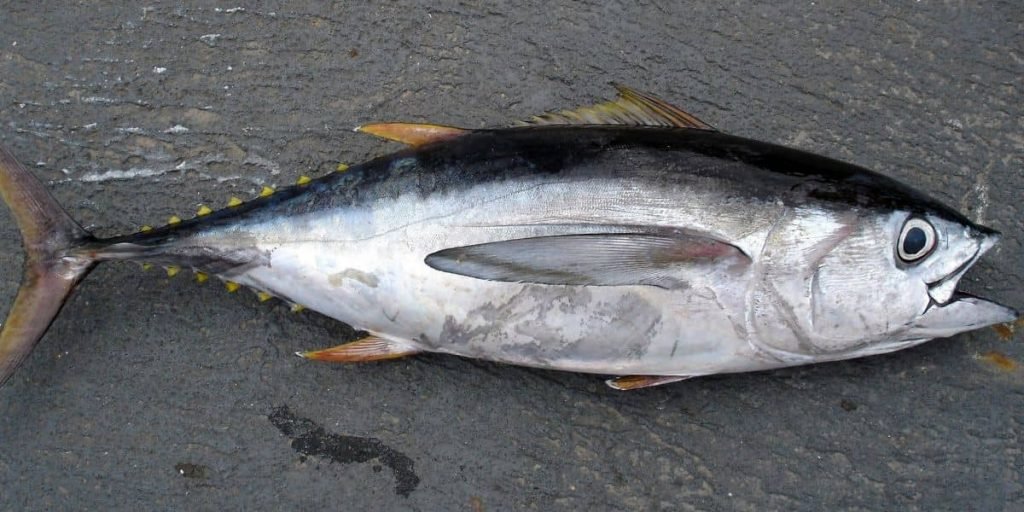
If you’re a seafood lover, incorporating fatty fish like salmon or tuna into your diet can do wonders for your dental health. These types of fish are rich in omega-3 fatty acids, which have been shown to reduce inflammation and promote gum health.
Additionally, consuming fatty fish can help strengthen your teeth by providing calcium and vitamin D, two essential nutrients for bone health. When it comes to cooking methods, grilling or baking the fish is a healthier option than frying. This preserves the nutritional value of the fish while also reducing potential risks such as exposure to harmful chemicals from oil or high levels of sodium in fried food.
It’s important to note that sustainability should also be considered when choosing which type of fish to consume. Opting for wild-caught instead of farmed can help preserve marine ecosystems while still enjoying the health benefits of fatty fish.
Incorporating fatty fish into your diet is just one way to improve your dental health. Another surprising food with dental benefits is strawberries!
14. Strawberries

You’re probably not aware of this surprising dental superfood, but have you ever considered adding strawberries to your diet? Not only are they a delicious and refreshing fruit, but they also provide numerous nutritional benefits for strong teeth and gums.
Here are some health benefits and tips for incorporating strawberries into your diet:
- Nutritional benefits: Strawberries are rich in vitamin C, which helps strengthen blood vessels and connective tissue in the gums. They also contain antioxidants that fight inflammation and bacteria in the mouth.
- Recipes: Some tasty ways to enjoy strawberries include slicing them up on top of yogurt or oatmeal, blending them into smoothies, or making a fresh strawberry salsa to serve with grilled chicken or fish.
- Seasonal availability: Strawberries are typically in season from late spring through early summer, so take advantage of their freshness during this time.
- Tips for incorporating into diet: Try swapping out sugary snacks with sliced strawberries as a healthy alternative. You can also add them to salads or use them as a topping on desserts instead of processed sugars.
Incorporating strawberries into your diet is an easy way to support good oral health. Now let’s move onto the next step where we’ll explore another surprising dental superfood – broccoli!
15. Broccoli

Don’t overlook this often underrated vegetable – broccoli is packed with nutrients that can benefit your dental health in surprising ways. In addition to being a good source of vitamin C, which helps maintain healthy gums, broccoli also contains calcium and phosphorus that strengthen teeth enamel.
Moreover, it has antioxidants that protect against the bacteria that cause gum disease and tooth decay.
To fully reap the benefits of broccoli for your dental health, try incorporating it into your meals regularly. You can steam or roast it as a side dish or add it to salads, soups, and stir-fries. For a quick and easy snack, dip raw broccoli florets in hummus or yogurt-based dips.
Broccoli is not only nutritious but also delicious when prepared right – experiment with different recipes and cooking methods to find what works best for you.
As we move on to the next topic about kiwi, remember that incorporating these nutrient-rich foods into your diet can help improve your oral health and overall well-being.
16. Kiwis

Broccoli isn’t the only vegetable that can boost oral health. Another fruit to consider adding to your diet is kiwi, also known as Chinese gooseberry.
This small fruit packs a punch when it comes to nutrients, including vitamin C, vitamin K, and fiber, all of which are essential for strong teeth and gums.
- Eating kiwi regularly can help prevent gum disease by reducing inflammation in the mouth.
- Kiwi’s high water content promotes saliva production, which helps wash away food particles and bacteria from your teeth.
- Kiwi contains an enzyme called actinidin that breaks down protein molecules in food, preventing plaque buildup on teeth and reducing the risk of cavities.
- The vitamin C in kiwi acts as a natural teeth whitener by breaking down stains on tooth enamel.
Compared to other fruits, kiwi stands out for its unique combination of nutrients that promote dental health. While many fruits contain vitamin C and fiber, few have such high levels of both like kiwis do.
If you’re looking for ways to incorporate more kiwis into your diet, try blending them into smoothies or chopping them up as a topping for yogurt or oatmeal. You can even slice one up and eat it as a snack on its own!
Now let’s move onto our next food for strong teeth and gums: sweet potatoes…
17. Sweet Potatoes
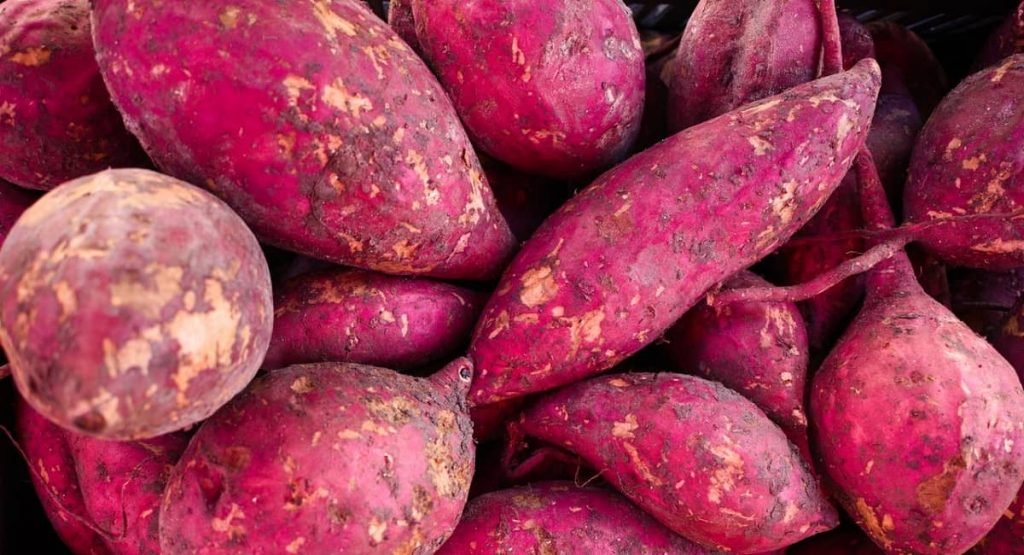
If you’re looking for a colorful and delicious addition to your diet, sweet potatoes may be just what you need. Not only are they packed with flavor, but they also offer numerous benefits for your teeth and gums.
Sweet potatoes are rich in vitamins A and C, which play a crucial role in maintaining healthy gums. Vitamin A helps produce saliva that washes away harmful bacteria while vitamin C strengthens the connective tissues of your gums, keeping them firm and protecting against periodontal disease.
Additionally, the fiber content in sweet potatoes promotes good digestion by stimulating saliva flow and preventing plaque buildup on teeth.
| Nutrient | Amount per 100g | % Daily Value |
|---|---|---|
| Calories | 86 | 4% |
| Carbohydrates | 20 | 7% |
| Fiber | 3 | 12% |
| Protein | 1.6 | 3% |
| Vitamin A | 14,187 IU | 384% |
Sweet potatoes can be easily incorporated into your meals through various recipes such as baked sweet potato fries or mashed sweet potatoes as a side dish. When cooking sweet potatoes, it is best to leave the skin on as it contains most of the fiber and nutrients. Roasting or boiling them instead of frying will also retain their nutritional value.
18. Garlic
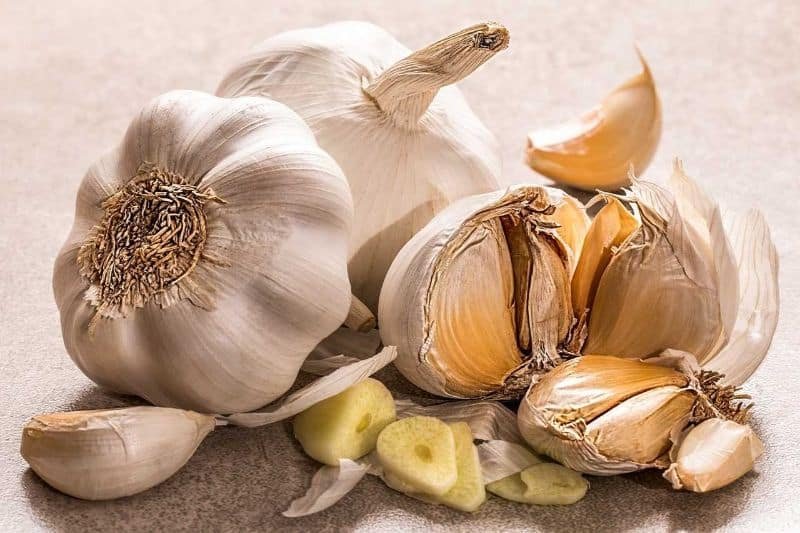
You’ll be happy to hear that incorporating garlic into your meals can have positive effects on your oral health. Garlic is known for its anti-inflammatory properties, which help in reducing gum inflammation and preventing periodontitis. The sulfur compounds present in garlic are also beneficial in fighting harmful bacteria, thereby reducing the risk of tooth decay.
When it comes to cooking with garlic, there are many delicious ways to incorporate it into your meals. You can add minced garlic to soups, sauces, and stir-fries or roast whole cloves for a milder flavor. However, it’s important to note that consuming too much garlic may lead to bad breath and potential side effects such as heartburn or upset stomach.
Overall, adding some garlic into your diet can provide excellent health benefits for both your teeth and gums.
As we move onto the next subtopic about onions, you’ll find that they too have numerous health benefits for maintaining strong teeth and gums.
19. Onions

When you’re craving a savory and satisfying meal, onions just happen to be a versatile ingredient that can add depth of flavor to many dishes.
From soups and stews to salads and sandwiches, onions are a culinary staple around the world. But they offer more than just taste – onions have numerous health benefits as well.
Onions contain antioxidants that help prevent cell damage and reduce inflammation in the body. They also contain compounds that may help lower cholesterol levels and improve heart health.
Onions are also rich in vitamins C and B6, which support healthy skin, hair, and immune function. Plus, they’re low in calories and high in fiber, making them a great addition to any diet.
So next time you’re cooking up a storm in the kitchen, don’t forget about the humble onion – it’s more than just an aromatic vegetable!
As much as onions can be beneficial for most people’s diet plans because of their nutritional value, some individuals may experience allergies when consuming them.
If you experience symptoms such as difficulty breathing or hives after eating onions or dishes that contain them, consult with your healthcare provider immediately for proper diagnosis and treatment options.
Moving on from onions, let’s talk about another food item that is not only delicious but also offers various health benefits – shiitake mushrooms!
20. Shiitake Mushrooms
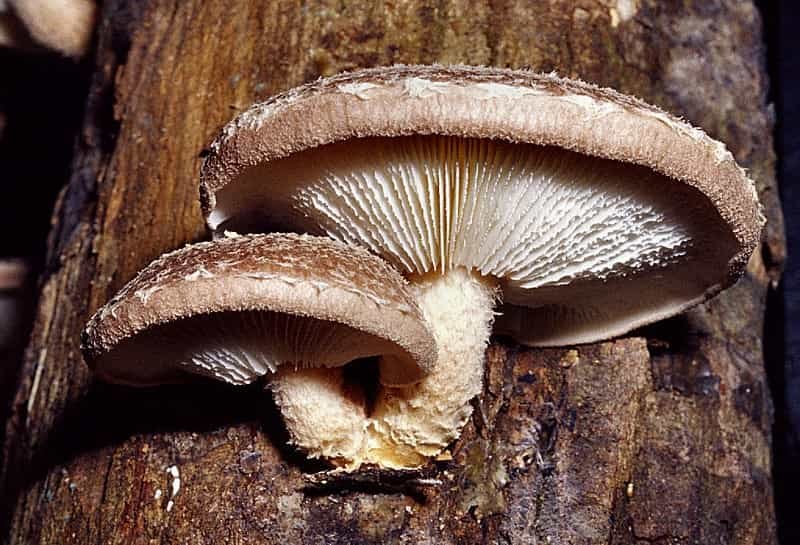
Get ready to add some umami flavor and nutritional value to your meals because shiitake mushrooms are a versatile ingredient that can be used in many dishes. These mushrooms have a savory taste and are often used in Asian cuisine, but they can also be added to soups, stews, salads or even stuffed with cheese for an appetizer.
The good news is that not only do they taste great, but they also have numerous health benefits. Shiitake mushrooms are low in calories and high in fiber, making them a great addition to any healthy diet. They also contain vitamins B and D as well as minerals such as copper, zinc, selenium and potassium which help support strong teeth and gums.
To prepare shiitake mushrooms for cooking simply rinse them under cold water before slicing off the stems. You can cook them by sautéing them with garlic or ginger for added flavor or simply adding them raw to your salad.
Now that you know the benefits of shiitake mushrooms and how easy it is to prepare them, let’s move on to another food that will benefit your oral health – green tea!
21. Green Tea

Green tea is a popular beverage that has been shown to have numerous benefits for oral health. Drinking green tea regularly can help reduce the risk of developing oral cancer by up to 50%. This is due to the presence of polyphenols in green tea, which are powerful antioxidants that can prevent cell damage and protect against cancer.
In addition to reducing the risk of oral cancer, green tea also has antibacterial properties that can help fight off harmful bacteria in the mouth. This can help prevent gum disease and tooth decay.
However, it’s important to note that brewing techniques and quality of tea leaves can affect its potency. Green tea should be brewed at a temperature between 160-180°F for no more than 2 minutes in order to maximize its benefits.
Compared to black tea, which undergoes a more intensive oxidation process, green tea retains more polyphenols and therefore offers greater health benefits. Additionally, some studies suggest that green tea may also aid in weight loss by boosting metabolism and reducing appetite.
Moving on from discussing the many benefits of green tea, let’s now take a look at some foods you should avoid if you want strong teeth and gums.
Worst Foods For Teeth And Gums
Avoid eating sugary snacks and drinks as they can lead to tooth decay and gum disease. The impact of sugary drinks on oral health is significant. Bacteria in the mouth feed on sugar, producing acid that erodes enamel and causes cavities. Moreover, frequent consumption of sugary drinks can also cause gum disease by promoting inflammation.
Smoking is another habit that harms teeth and gums. It diminishes blood flow to the gums, causing them to recede and exposing the roots of teeth. This not only makes teeth sensitive but also increases the risk of tooth loss. Smoking also stains teeth yellow or brown, leaving a lasting mark on your smile.
Good dental hygiene habits are essential for maintaining healthy teeth and gums. Brushing twice a day and flossing daily helps remove plaque buildup that can lead to cavities and gum disease.
Avoiding sugary snacks and drinks, quitting smoking, practicing good dental hygiene habits regularly, and scheduling routine dental visits are all steps you can take towards ensuring strong teeth and healthy gums.
Remember that prevention is always better than cure when it comes to oral health!
Conclusion
Ultimately, prioritizing oral hygiene and making conscious choices about our habits can lead to a healthier and more confident smile. Through this discussion, we’ve seen the importance of taking care of our teeth and gums for overall wellness.
By incorporating healthy foods into your diet, you can further support the longevity of your teeth and gums. Eating foods rich in calcium, like dairy products or leafy greens, can benefit your teeth by strengthening the enamel. This helps to prevent decay and damage caused by acidic substances in food and drink.
Additionally, consuming fruits and vegetables high in vitamin C is beneficial for gum health as it aids in collagen production, which strengthens gum tissue. It’s important to note that while certain foods may be beneficial for dental health, it’s also crucial to practice proper oral hygiene habits such as brushing twice a day and flossing regularly.
While eating healthy foods is a great way to support strong teeth and gums, it should not replace these essential practices. By following these tips and precautions, you can ensure that your smile stays bright for years to come.
Frequently Asked Questions
Read Also
